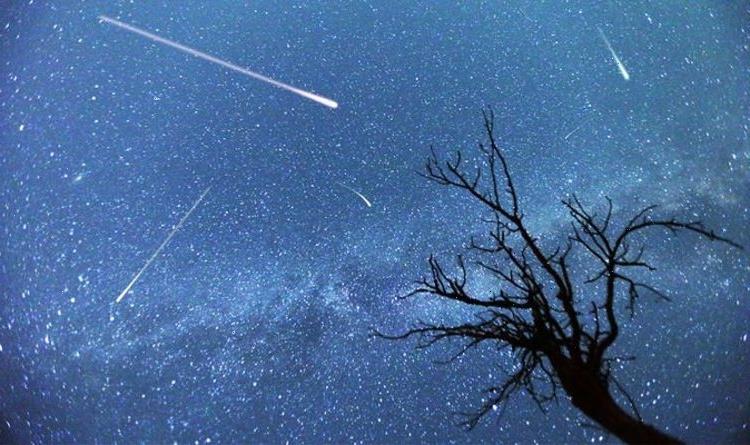Meteor spotted in night sky over Northern Ireland
We use your sign-up to provide content in ways you’ve consented to and to improve our understanding of you. This may include adverts from us and 3rd parties based on our understanding. You can unsubscribe at any time. More info
Delta Aquarrids burst into the night skies each year from about mid-July when our planet crosses the orbit of Comet 96P Machholz. When this happens, individual bits and pieces of the “dirty snowball” crash into our atmosphere at breakneck speeds and burn up before reaching the ground. The meteor shower is typically active from about mid-July until about the end of August.
But it’s one night, in particular, that astronomers are most excited about – the night of the shower’s peak.
During the Delta Aquariids’ peak, the highest concentration of hourly meteors will be visible.
According to Dhara Patel, an astronomer at the Royal Observatory Greenwich in London, up to 20 meteors an hour will be visible during this year’s peak.
And if that was not enough, the expert told Express.co.uk the Alpha Capricornids will peak at the very same time.


What is the best time to see the Delta Aquariids this week?
The meteor shower will peak this year on the night of Wednesday, July 28, through to the morning of Thursday, July 29.
If you get lucky, you might also see one or two shooting stars on the nights just before and after the peak.
Ms Patel said: “Although it’s been active since mid-July and will continue through until August 24, the Delta Aquariids meteor shower peaks this week on the evening of July 28 and into the early morning of July 29.”
According to the astronomer, the shower will be best seen after 11pm BST.
This is when the shower’s so-called radiant point – the point from which they appear to enter the skies – will appear above the horizon.
The radiant sits in the constellation Aquarius and will appear in the southeast before climbing higher into the sky.
Meteor spotted in night sky over UK
Ms Patel said: “Up to 20 meteors per hour may be seen emanating out from the shower’s radiant (which lies close to Jupiter) in the constellation of Aquarius.
“Try to get away from urban, built-up areas – you’ll need a good view of the horizon, and limited light pollution makes for more favourable viewing conditions.”
As the radiant climbs higher and higher, the skies will turn darker.
The key to any meteor hunting session is the presence of clear, dark skies.
Unfortunately, this month’s efforts will be hindered by the presence of a Waning Gibbous Moon.
The Moon will be more than 70 per cent illuminated on Wednesday night and that threatens to wash out the skies.


But if this does not deter you, you can still try and make the best of a bad situation.
Look for a wide-open area free of distracting lights and objects on the horizon.
A field or park far from the bustle of city life is perfect as it allows you to see the whole sky at once when you lie on your back.
Keep in mind that light pollution from buildings, street lamps and cars is very bad in cities and it will make it harder to see the meteors.
Once you find the perfect spot, dress up appropriately for the weather and grab a supply of snacks and water.
You might find yourself sitting outside for a few hours so have a friend join you – you can play a game by calling out meteors each time you see one.
Turn your phone off and give your eyes time to adjust to the dark.
Once the Delta Aquariids burst into the night sky they will travel in all sorts of directions so there is no need to search for the radiant.
However, if you catch a few, try to trace their path back to Aquarius.
Be fast though! Meteors tend to hit speeds of seven to 45 miles per second.
Source: Read Full Article
